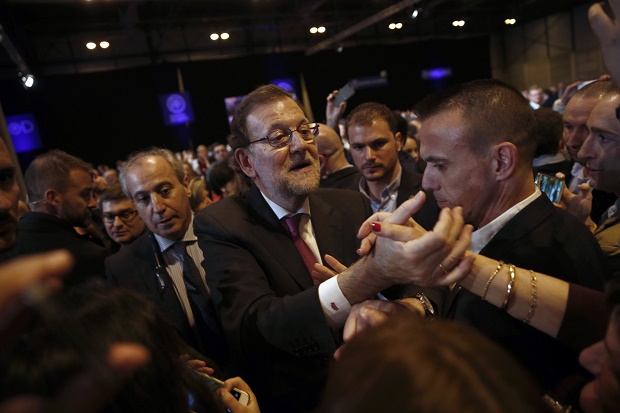Suspense as Spain’s eventful election campaign draws to a close

Popular Party leader and current Prime Minister of Spain Mariano Rajoy is greeted by supporters as he arrives for a closing campaign event in Madrid, Spain, Friday Dec. 18, 2015. The rise of two influential new parties to challenge the two traditional parties of government has injected tension and suspense into the ballot as Spanish voters go to the polls on Sunday in general elections. AP Photo
MADRID, Spain—Marked by an acrimonious debate, a punch in the face, star turns on TV and four very different main contenders, Spain’s election campaign came to an official close Friday ahead of this weekend’s general election.
READ: Singing, dancing for votes: ‘Pop politics’ bursts in Spain elections
For two weeks, incumbent Prime Minister Mariano Rajoy and his rivals have criss-crossed the country on a mission to seduce voters whose disillusionment over corruption and austerity measures has fuelled the rise of dynamic new parties that could make a splash in Sunday’s polls.
“There’s a lot more enthusiasm for politics than four years ago, and everything indicates that… there will be high levels of participation,” the centre-right El Mundo daily wrote in an opinion piece ahead of the legislative election.
Polls predict that Rajoy’s ruling, conservative Popular Party (PP) will win the largest share of the vote but without an absolute majority, which will force it to get into bed with another political grouping to wield any kind of power.
Article continues after this advertisementBut whether it will manage to do so—and with whom—remains a mystery as the main opposition Socialists are expected to come neck-and-neck with two upstart parties campaigning for change, the centrist Ciudadanos and anti-austerity Podemos.
Article continues after this advertisement“I’m convinced that the Spanish will ask for change,” Ciudadanos’s 36-year-old leader Albert Rivera told supporters in Madrid’s old town at the close of his campaign, after coming onstage to rousing music and applause.
“I’m convinced that these years of weariness, of corruption… are coming to an end,” he said as people clad in orange scarves—the colour of his party—looked on.
One in four undecided
Jose Pablo Ferrandiz, head of polling group Metroscopia, says that at the last elections in 2011, the PP’s absolute majority win came as no surprise.
“But now, just two days ahead of the election, one in four voters remains undecided,” he adds.
And that is the main change in this campaign—from a long-standing bi-party political scene, Spanish voters now have four very different groupings to choose from as well as the usual spattering of smaller-scale contenders.
Sky-high unemployment, rising inequalities, corruption scandals and an independence movement in Catalonia are just some of the issues broached during the campaign.
Rajoy, 60, has positioned himself as a safe pair of hands who dragged the country away from economic collapse and put it on the path of recovery, as evidenced by Christmas shoppers vying for space in the centre of Madrid.
Voters should not accept the image of a “black Spain which certain people want to paint, it is a lie,” he said at a rally in the eastern city of Valencia.
Later during his final rally in Madrid Rajoy warned that Spain “could not afford” to “play with experiences, with novelty.”
Socialist chief Pedro Sanchez, 43, has promised to reinstate the rights of workers and immigrants whom he says the PP trampled on with its spending cuts, tax rises and controversial health reforms.
Pablo Iglesias of Podemos, 37, promises to defend “the lower classes” while Rivera pledges “reasonable change”, more investment in education and less precarity in the workplace.
Podemos, which had lost steam after a highly-publicised rise on the national scene in 2014, appears to be gaining ground again and could even replace the Socialists as the country’s main left-wing party, polls suggest.
Saturday is an obligatory “day of reflection” ahead of the vote and no campaigning is allowed.
Eventful campaign
Candidates in this year’s campaign may be remembered more for their star turns on television and in glossy magazines than for their policy proposals.
Iglesias strummed a guitar on TV, Rivera posed in Glamour magazine and even Rajoy discarded his long-held suspicion of the media when he appeared on a chat show to discuss his personal life.
The campaign also took on an aggressive turn, particularly in its last week.
A debate between Rajoy and Sanchez on Monday went sour when the prime minister’s rival accused him of not being a decent person, demanding to know why he had not resigned over repeated corruption scandals that hit the PP since 2011.
“Miserable wretch,” Rajoy responded angrily, losing his legendary calm. “I am an honest politician.”
Then on Wednesday, as the premier mingled with crowds in Pontevedra city in his northwestern fiefdom of Galicia, a teenager suddenly punched him in the face, knocking off and breaking his glasses.
READ: Teen punches Spanish PM in face, breaks his glasses
Rajoy was not badly hurt and the 17-year-old was quickly detained, but the incident made headlines into Friday.